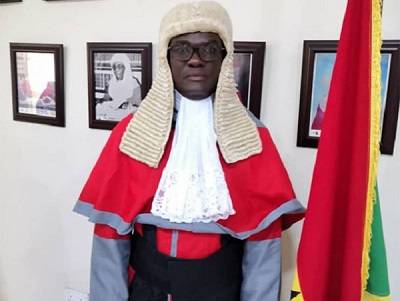
The Supreme Court has rejected an objection to the empanelment of Justice Ernest Gaewu inhigh-stakes case involving the Speaker of Parliament, Alban Bagbin.
This ruling, delivered on Wednesday, October 30, follows a challenge by Thaddeus Sory, the lawyer representing the Speaker, who argued that Justice Gaewu’s previous political affiliations might compromise his impartiality.
Central to Mr. Sory’s argument is Justice Gaewu’s past as a parliamentary candidate for the New Patriotic Party (NPP), the ruling party in Ghana.
According to Sory, Gaewu’s association with the NPP raises questions about potential biases that could affect his decisions in this case.
Given that the case involves parliamentary seats, the Speaker’s legal team contends that even a perceived bias could undermine public confidence in the judiciary.
In a bid to ensure a fair trial, Speaker Bagbin’s lawyers have requested Justice Gaewu’s recusal, emphasizing the need for an impartial judiciary, especially in cases that impact the structure and representation of Parliament.
They argue that Justice Gaewu’s previous candidacy for the NPP poses a significant conflict of interest, one that could affect judicial objectivity and fairness.
As a former candidate, Gaewu’s ties to the ruling party, they assert, could subtly influence his judgment in a case that carries major political repercussions.
The case in question arose after Speaker Bagbin declared several parliamentary seats vacant—a decision that has significant implications for the distribution of political power within Ghana’s legislature.
A prior ruling by the Supreme Court had granted a stay on Bagbin’s declarations, preserving the current composition of Parliament until the issue is resolved.
Speaker Bagbin’s legal team now seeks to reverse this stay, aiming to reinstate his decision and potentially reshape the parliamentary landscape.
In court, Sory underscored the importance of Justice Gaewu’s political history, saying, “His past association with the New Patriotic Party (NPP), having once run as their parliamentary candidate in the Volta Region, raises genuine concerns over potential biases.”
Despite these concerns, the Supreme Court decided to keep Justice Gaewu on the panel, signalling its confidence in his ability to remain impartial.
This decision sets the stage for a high-profile legal confrontation with significant ramifications, not only for Ghana’s parliamentary dynamics but also for the broader principles of judicial independence and integrity.
Observers are closely watching this case, as it explores the delicate balance between the judiciary’s independence and the influence of political affiliations in high-stakes legal decisions.
The outcome could serve as a defining moment for Ghana’s judicial system and its commitment to impartiality in cases with political undertones.
Story by: Mercy Addai Turkson



